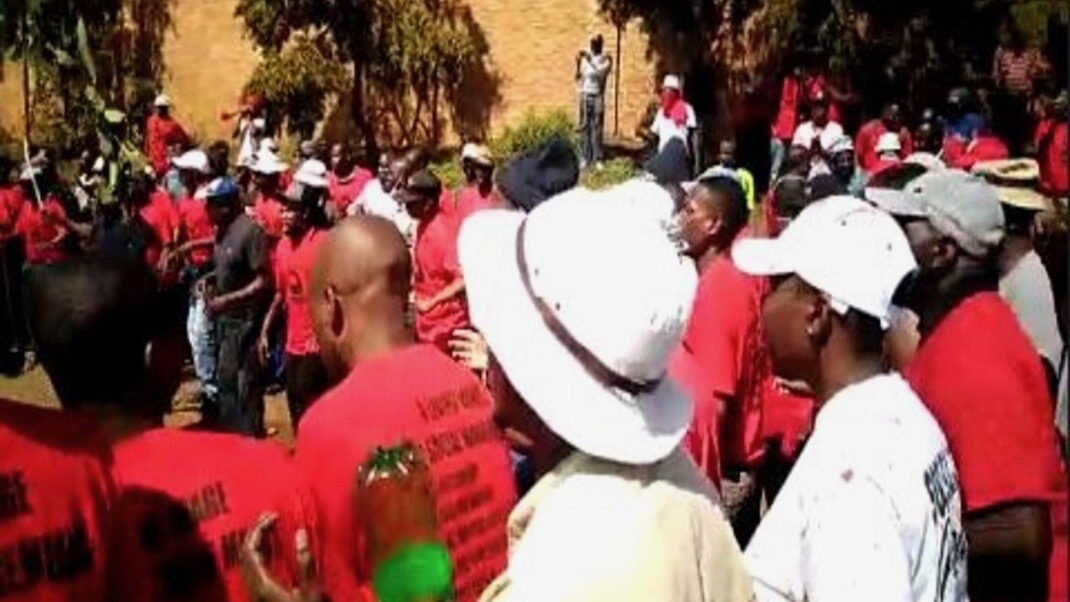On October 13, Tuesday, a member of the General Industrial Workers Union of South Africa (GIWUSA) was killed after the police fired rubber bullets on striking workers of South Africa’s largest dairy company, Clover Industries. Khilson Manaka was hit by a car as he ran for safety from the bullets and died of skull injuries. Two other workers who were with him have been arrested.
As many as 2,000 of the total 6,000 workers employed by Clover Industries across South Africa have downed tools since Tuesday. They are demanding a pay rise of 16% and an end to outsourcing through labor brokers.
According to GIWUSA deputy general secretary Charles Phahla, the workers were not even protesting when the police opened fire on Tuesday, but were returning home from a demonstration at the company’s depot in Clayville. “Throughout the day, the police kept a watch on our demonstration at the plant in Clayville, consuming food and drinks Clover was offering them. But there was no disturbance in the day,” Phahla told Peoples Dispatch. Demonstrations outside Clover’s plants in Bloemfontein, Clayville, Milnerton, Parow, Polokwane and Queensberg were also peaceful.
The workers were intercepted at a crossing on their way back, where the police “started shooting everyone wearing our union’s red T-shirt,” Phahla said. Regarding the workers who have been arrested, he added, “We don’t know what charges are being pressed against them. Our lawyers are trying to secure their release.” The arrested workers are expected to be produced in court on October 15.
In the meantime, the strike action and the accompanying demonstrations at different plants “will continue until the management heeds our demands,” Phahla said. “We are also calling on the public to support us by boycotting all Clover products,” he added.
Union demands 16% wage hike
Workers at Clover Industries have been demanding a 16% raise in the minimum wage at the company, from the current R5,500 (USD 330) to R8,000 (USD 480). “They first dismissed our demands as unreasonable and said they will give no rise at all,” said Phahla, adding that “between 2017-19, the directors of the company gave to themselves a raise ranging from 27% to 32%, while the workers got only 7.5% for the same period.”
He also pointed out that “Throughout the lockdown, workers have been laboring in Clover’s diary plants,” which were exempted as an essential service. Many workers also contracted COVID-19 because of unsafe working conditions.
In May, GIWUSA temporarily shut down the Bloemfontein plant, alleging violation of safety protocols by the management, which led to increasing positive cases at the plant and exposure of other workers to COVID-19.
“There were no masks, PPEs or sanitizers initially. We had to struggle for those. Except for a one time payment of R800 (USD 48), we got no risk allowance. Now when we ask for a hike, they better not tell us we are unreasonable,” Phahla claims.
Clover has released a statement claiming that additional costs incurred on workplace safety during the pandemic is one of the reasons the company is not in a position to accept the 16% hike demand.
During the negotiations at the Commission for Conciliation, Mediation and Arbitration (CCMA) on September 2 and 3, Clover maintained that its final offer was for a 3% hike, which was refused by the union. When negotiations deadlocked, the CCMA issued a certificate of unresolved dispute on September 28, allowing GIWUSA to go on a protected strike – i.e a strike action for which the employer cannot fire the workers.
After GIWUSA served a strike notice on October 9, Clover upped its offer to 5% a day before the strike was set to begin, on October 12. This was also rejected by the union.
End labor brokering
The other key demand of the workers is ending the practice of hiring workers through labor brokers. The company has refused to engage with this demand as well. As per Phahla, an estimated 40% of Clover’s total employees are hired through labor brokers. Even though these workers perform the same work as direct employees, “they receive no benefits, no provident fund, no pension.”
The Constitutional Court had ruled in 2018 that any worker employed through a labor broker on less than R205,000 per annum (USD 12,294) becomes an employee of the firm after three months. However, Clover has been accused of circumventing this ruling by using a loophole, which is the requirement of clocking a minimum of 45 hours per week on the factory floor by the worker.
Workers hired through labor brokers do not have fixed hours per week. According to Phahla, the management rotates the workers in a manner that their weekly work-hours fall just short of 45 hours. This prevents them from technically qualifying as permanent employees of the company.
“You find that all the workers employed through labor brokers are blacks,” Phahla said, claiming that there is a racial dimension to this practice. “These people have worked for the same company for 10 years and they are still not technically permanent employees. A white person will seldom find himself in such a position,” he claimed.
Should Clover persist in its refusal to engage with the workers and address their demands, “we will intensify our actions, and start a sit-in protest at the company’s head office in Roodepoort,” Phahla asserted.





